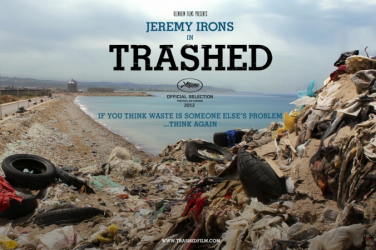Activities
3 May, 2017
Gender Pioneers Award Ceremony
Former IPEN Co-Chair & Senior Advisor to the National Toxics Network Dr. Mariann Lloyd-Smith and Pesticide Action Network (PAN) Asia & the Pacific Director Sarojeni Rengam were among those honored at the Gender Pioneers for a Future Detoxified ceremony. The awards sought to recognize women and men for their achievements in advancing gender equality and mainstreaming gender issues in the area of chemicals and wastes.
See PAN Asia & the Pacific's press release about the award here.
See National Toxic Network's post about the award here.
28 April, 2017
IPEN Side Event: Screening of the documentary "Trashed"
Lee Bell, IPEN POPs and Mercury Advisor, introduced the film “Trashed.” Trashed is an environmental documentary written and directed by British film-maker Candida Brady. It follows actor Jeremy Irons as he investigates the global scale and impact of humanity's modern wasteful consumerism and pollution. The film is a call for urgent action to resolve the issue of existing deposits and drastically reduce our consumption towards sustainable levels and zero waste, but also demonstrates how this is already being achieved successfully in many communities around the world. The film was particularly relevant to show during the Conference of the Parties as discussions about low POPs content levels and other waste-related issues were taking place.
27 April, 2017
Recycling of POPs is Not Allowed in the Stockholm Convention
This morning at the Conference of the Parties, IPEN and friends reminded delegates coming in to the venue about the legal obligations of the Stockholm Convention.
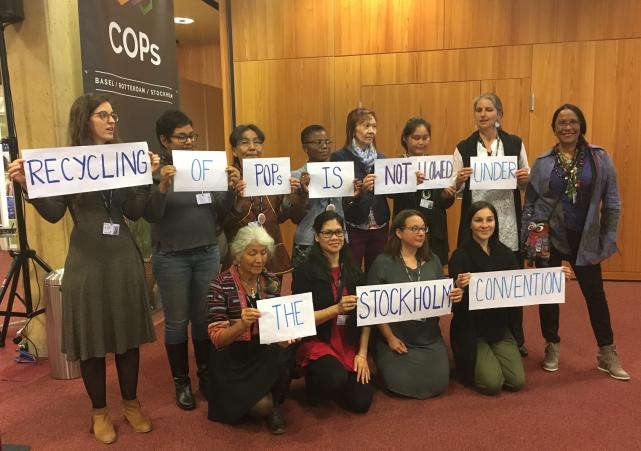
27 April, 2017
ISACI, NTN and PAN side event
IPEN Participating Organizations and Partners Island Sustainability Alliance, Cook Islands (ISACI), National Toxics Network (NTN), and Pesticide Action Network (PAN) Aotearoa / Asia Pacific hosted a side event with the Rotterdam Convention on hazardous pesticide use in Small Island Developing States and safer alternatives.

27 April, 2017
Opening of the Technology Fair
IPEN participated in the COPs Technology Fair by further highlighting how an X-ray fluorescence machine can be used to test various items for certain POPs and heavy metals. Jitka Strakova from Arnika Association showed delegates how specific toys were tested; the results for which were published in the IPEN report POPs Recycling Contaminates Children's Toys with Toxic Flame Retardants.
Also during the Technology Fair, Tiffany Tool (IPEN) used a hand blender to make fruit smoothies for Conference delegates visiting IPEN's Toxic Toy Store. She explained that, although the hand blender used to make the smoothies at the booth was tested and did not contain short-chain chlorinated paraffins (SCCPs), studies have shown that hand blenders used for food preparation leak SCCPs under normal use. The Stockholm Convention's POPs Review Committee (POPRC) recommended that SCCPs be listed in the Convention during the COP8. IPEN tested various toys (and other products) for SCCPs and the results are included in the new report Toxic Industrial Chemical Recommended for Global Prohibition Contaminates Children's Toys.
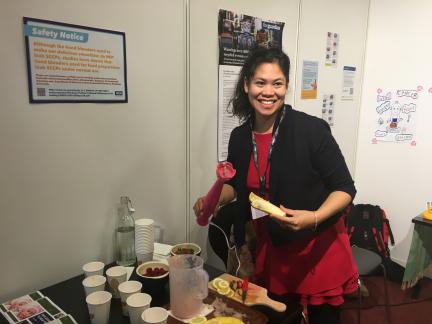
26 April, 2017
IITC and ACAT side event
IPEN Participating Organizations International Indian Treaty Council (IITC) and Alaska Community Action on Toxics (ACAT) hosted a showing of the film "Circle of Poison."
"Circle of Poison shows how the global pesticide industry is politically powerful, shaping regulations (or lack thereof) and the conditions of food and farming around the world. Yet for every victim of the industry there are even more people fighting for their rights to safety and health and creating alternatives to the agrochemical industrial complex. From organic farm co-ops in Mexico and Argentina to a growing farmers market in India to the entire country of Bhutan becoming 100 percent organic, people are finding ways to grow food that is healthier for their families, communities, and the environment that don’t rely on or enrich the agrochemical corporations that have poisoned them."
The film will be immediately followed by a panel.
Panelists:
Vi Waghiyi, Native Village of Savoonga, Alaska Community Action on Toxics (ACAT);
Carol Nagaruk, Native Village of Elim, ACAT;
Tai Pelli, Taino, International Indian Treaty Council (IITC);
Rochelle Diver, Fond du Lac Band of Lake Superior Chippewa (Anishinaabe), IITC (moderator)
Read more on the official website of Circle of Poison: http://www.circleofpoisonfilm.com/

25 April, 2017
Press Release: At UN meeting, Canada and Chile stand alone trying to legitimize e-waste dumping and promote recycling of toxic chemical into children’s products
Today, at the Stockholm Convention 8th Conference of the Parties, Chile and Canada surprised delegates by proposing to allow recycling materials containing a toxic flame retardant widely found in electronic waste (e-waste). The proposal violates the Stockholm Convention which explicitly prohibits recycling and reuse of substances on its list.
DecaBDE is used in the plastic casings of electronic products and if it is not removed, it is carried into new products when the plastic is recycled. Toxicity studies indicate potential adverse developmental, neurotoxic, and reproductive effects, and DecaBDE or its degradation products may also act as endocrine disruptors.
Ironically, a new IPEN study shows that the toxic recycling policy advocated by these countries widely contaminates children’s products. In fact, in Canada all sampled toys made of recycled plastic contained both OctaBDE and DecaBDE.
Read the entire press release here
24 April, 2017
On the first day of the Conferences of the Parties, IPEN unveiled its "Toxic Toy Store," which displayed numerous toys from around the world that were tested to determine potential toxic ingredients, as well as IPEN and Partner documents, including IPEN's Toxic Toy Store Spring 2017 Catalog. Short-chain chlorinated paraffins (SCCPs), decabromodiphenyl (DecaBDE) and hexachlorobutadiene (HCBD), which were found in some of the toys, are recommended for listing in the Stockholm Convention. One delegate, visibly distressed by the presence of toxic chemcials in the toys at the booth, stated that two of the toys being displayed were currently in her daughter's bedroom.
Also at the store, IPEN used a X-ray fluorescence machine to test various items from delegates (phone cases, wallets, eyeglasses, jewelry, etc.) for heavy metals and bromine on-the-spot.
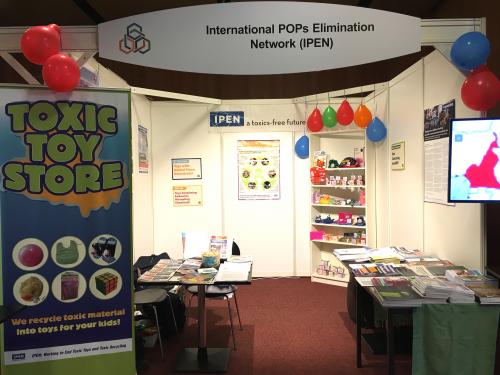
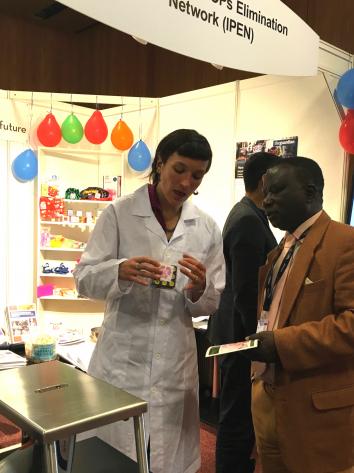
24 April, 2017
IPEN held a lunchtime side event entitled "Toxic toy or toxic waste?: Recycling POPs into new products" at the conference center in Geneva. Lee Bell, BA MA (ESD) (IPEN Mercury and POPs Policy Advisor) facilitated the event, and Joseph DiGangi, PhD (IPEN Senior Science and Technical Advisor), RNDr. Jindrich Petrlik (Director, Arnika Toxics & Waste Programme and IPEN Dioxin, PCBs and Waste Working Group) and Mgr. Jitka Strakova (Arnika Toxics and Waste Progamme and IPEN Dioxin, PCBs and Waste Working Group) presented information related to two recent IPEN studies about brominated flame retardants, short-chain chlorinated paraffins, and other chemicals in toys; a new IPEN report about fly ash; toxic waste; low POPs content levels; and toxic recycling.
As delegates entered the event, IPENers handed them small bags filled with sugar that represented each person's approximate share of waste incineration ash that is produced each quarter of the year per each person living on planet Earth. The bags weighed 350 g. (slightly more than 1 ppb concentration), and, were it real waste incineration ash, it would contain approximately 375ng TEQ of dioxins. This amount of dioxins, if eaten, would be over 2,000 times a human's tolerable daily intake (2 pg/kg body weight/day). Even a 100 times lower exposure to dioxin (which can result in real contaminated food) is still worrying! The current Low POPs Content Level for dioxins in wastes (such as fly ash) is 15 ppb- 15 times more than the amount handed to the delegates attending the side event. IPEN believes that delegates must adopt the more stringent value for Low POPs Content Level for dioxin (PCDD/F) of 1 ppb.

Conference variant



